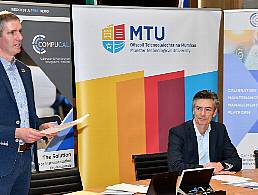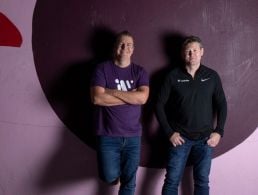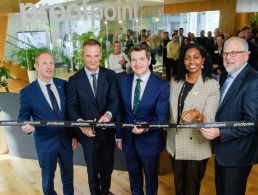Margaret Kelleher studied psychology and psychiatry, but now she researches the genetics of cow fertility and cattle breeding.
Margaret Kelleher researches the genetics of Irish cattle at the Irish Cattle Breeding Federation, but the path she took to get to this place in her career might surprise you.
Having studied psychology at Maynooth University and psychiatric research at King’s College London, she went on to repurpose her skills for evaluating the fertility of cows and lecturing on animal breeding at Cork Institute of Technology.
In the spirit of Science Week, we spoke to her to find out why not all roads to and from STEM are clear-cut and bump-free.
‘Although my route was not straightforward, there are benefits to coming from a different field of study. You are more likely to have different viewpoints and fresh ideas’
– MARGARET KELLEHER
Dr Margaret Kelleher, ICBF. Image: O’Gorman Photography.
Did you always see yourself as a future geneticist?
When I was deciding on my undergraduate degree, I did not know where or what I wanted to work on. All I knew for sure was that I loved maths and science and had a deep-rooted passion for farming.
Knowing that I wanted to further my education, I decided on a degree and thought that psychology was where I would end up. After four years spent completing my undergraduate degree, I spent a year in New Zealand farming, which I found to be hugely beneficial and which I enjoyed thoroughly.
I enrolled in King’s College London for my master’s and that is where I realised where I needed to be. Suddenly finding myself in the heart of London was the wake-up call.
Was it difficult to make the changes having realised that?
To fulfil my career ambition, I knew that I would have to find a way to bridge the gap between my strengths in maths, science and research with agriculture.
I considered enrolling on a second master’s in the area of animal genetics and breeding, but I was offered a PhD when I enquired at Harper Adams [University]. With this offer, I realised that what seemed like a huge transition between careers was not an issue due to the transferable skills and experience I had.
Because of this offer, I decided to investigate whether I could be offered a similar PhD back in Ireland with Moorepark [Teagasc research centre], and I was successful in my application.
What was the main thing you learned in pivoting your career path?
Although my route was not straightforward, there are benefits to coming from a different field of study. You are more likely to have different viewpoints and fresh ideas.
The most important thing, I think, is that you build on transferable skills. By doing so, then you keep doors open and perhaps even provide yourself with more opportunities and choices in terms of career options in the future.
What surprised you the most about your career journey?
The biggest surprise was that an animal breeding researcher could see my potential and skillset, even though all my education was in the field of psychology. Being offered a PhD without having to do a second masters’ in animal breeding to bridge the gap was unexpected at the time.
My advice to anyone starting out on their academic journey is to identify your strengths firstly, and let that guide you to the career you desire. You might be surprised where you end up.
Even in my roundabout academic route, I have ended up with a job I love and would not change how I got here.




